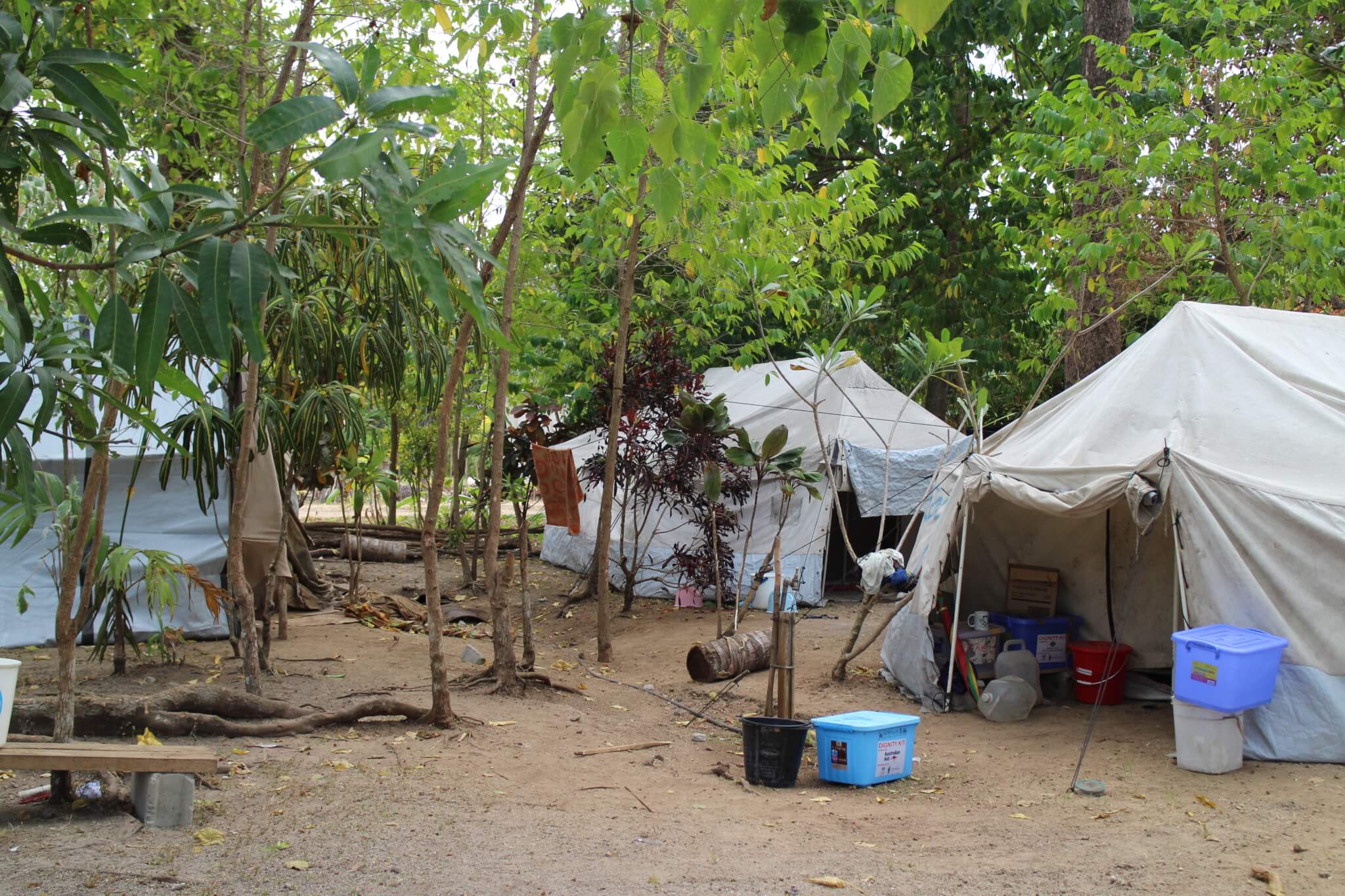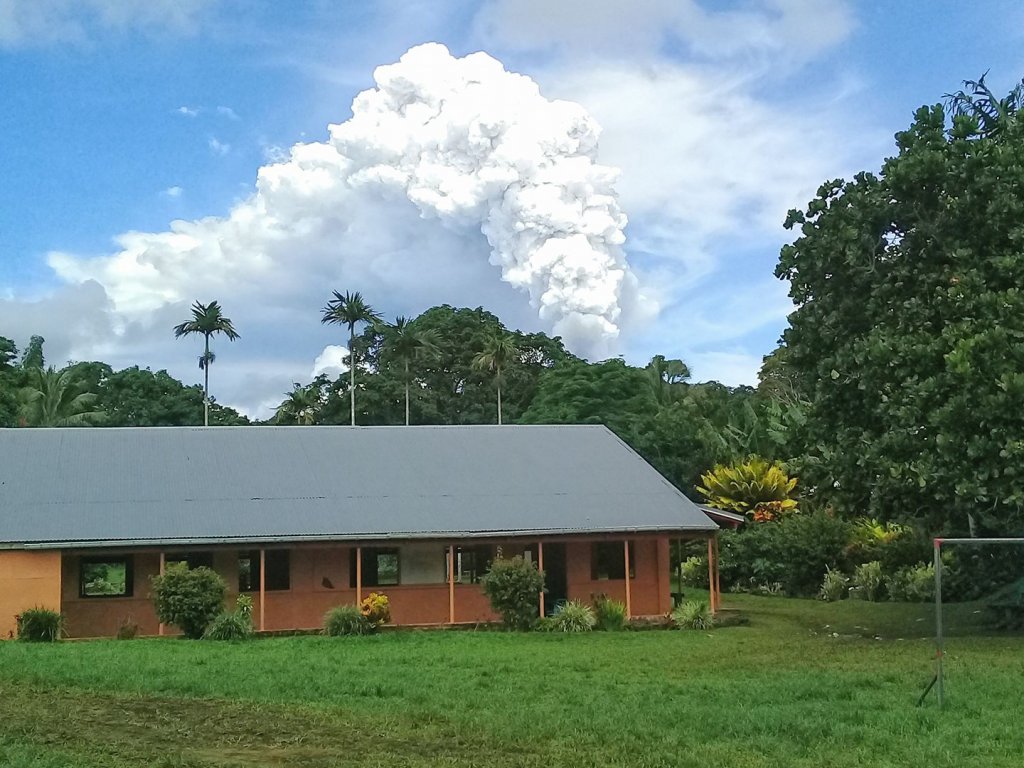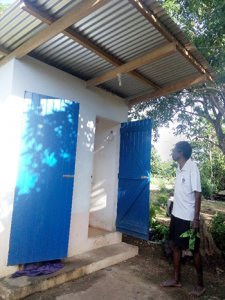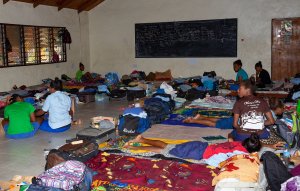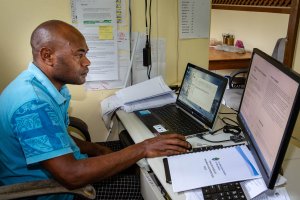It is often said that in the aftermath of disasters, long after the aid agencies and TV cameras have left, the Church is still there. This is true, but the reality is even more profound: the Church is there before and during the emergency – as well as after it – part of the community, moving with it, experiencing the disaster as well as responding to it.
What does this actually look like on the ground? How can the Church respond effectively? What impact might it have? The ongoing response of the Church in Vanuatu to the evacuation of Ambae provides moving insights and valuable lessons on how the Church can respond well. It also highlights the emotional and financial costs of doing so.
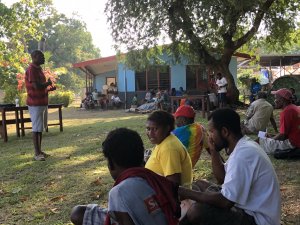
Fisher Young, ACOM, mobilising a co-ordinated response to the crisis across the churches on Santo. Photo credit: AOA
A volcano erupts
The archipelago of Vanuatu lies in the South Pacific, roughly 1,000 miles east of northern Australia. Vanuatu made headline news across the world in March 2015 when the strongest storm ever in the South Pacific, Cyclone Pam, ripped through the country causing widespread devastation. However, more recently Vanuatu has faced other emergencies which have not received so much media attention, but which have impacted many people.
In September 2017 the lake volcano of Monaro on Vanuatu’s Ambae island began to erupt, releasing large quantities of ash and creating acid rain. These combined to have severe impacts on the health of local people and livestock, to destroy agriculture, kill freshwater aquatic life and affect potable surface water. In October 2017 the government declared a state of emergency and Ambae’s entire population of 11,000 was mandatorily evacuated to nearby Santo island. People could only take what they could carry and suffered significant loss of livestock and agriculture. Among those having to relocate were the Anglican institutions St Patrick’s College, the vocational training centre there and the headquarters of the Melanesian Brotherhood, all of which were based on Ambae.
The Anglican Church on Santo played a key role in hosting people evacuated from Ambae in this initial emergency response, as described below. However, the crisis was far from over.
In November and December 2017, people started returning to Ambae and taking up their lives there again. But in March 2018 volcanic activity increased once again and in April a state of emergency was declared for the province of Penama, with the National Government starting to talk about permanently relocating the island’s population to other islands. All the schools on Ambae were closed and secondary schools relocated to other islands. As ash continued to fall throughout May 2018, those who could do so voluntarily left the island, mostly to the island of Santo, where the regional capital of Luganville is situated, and where the majority of the schools were relocated. In June and July the mandatory evacuation continued, with approximately 2,600 people being evacuated by the government to Maewo, and 7,500 going to Santo voluntarily. By August, the mandatory evacuation was complete, enforced by a police detachment on Ambae.
During this phase, the Church once again played an important, ongoing role in helping people relocate and was itself having to relocate key institutions once again.
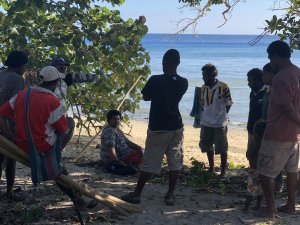
Ethel George, (Women’s Desk Officer), ACOM, advising evacuees on Maewo of their rights and responsibilities. Photo credit: AOA
Anglican Overseas Aid reported that the Church played a crucial role throughout the peak of the crisis: ‘Leadership summits facilitated by the Church were significant channels of sharing much needed information from the government to communities. Presentations from important stakeholders like the Police greatly eased stress and frustrations for evacuees through understanding the content and purpose of the State of Emergency, plus other important information.’
As 2018 came to an end, the state of emergency was lifted and the police presence on Ambae was removed. So, whilst the state of emergency is now over, people are somewhat in limbo. Some have returned – predominantly those who had been evacuated to the unpopular official relocation site of Maewo – and in February 2019 the Government announced it would reopen the schools on Ambae and not charge fees. ‘Stronger’ family members are returning first, to undertake the daunting task of re-establishing their homes and agriculture before the rest of the family follows. But people are also finishing their new houses in Santo or Maewo, with the intention of living in Ambae until the next significant eruption, when they’ll relocate to their ‘second house’ on Maewo or Santo. According to ACOM, the government is now encouraging people to return.
The Church responds
The Anglican Church has a significant presence in Vanuatu, part of the Anglican Church of Melanesia (ACOM). The Diocese of Vanuatu and New Caledonia was in fact inaugurated on Ambae, whilst its diocesan office is in Luganville on Santo. As well as being an integral part of the local community through its parishes and congregations, ACOM Vanuatu carries out extensive social and community work (see here) and has particular expertise in delivering water, sanitation and hygiene infrastructure. It is also proactively working to mitigate the impact of climate change and other disasters and has a Disaster Risk Reduction manager. The Church therefore already had structures in place, as well as much experience and expertise to draw on, as it responded to the unfolding emergency of Ambae.
So what did the response look like on the ground?
Watch: the short video below looks at how ACOM responded to the unfolding disaster; it includes interviews with Fisher Young, ACOM Vanuatu’s Disaster Risk Reduction Manager, Mrs Kathleen Tahi, the Principal of St Patrick’s College, ACOM’s secondary boarding school, and with one of the pupils who talks about what it was like to be evacuated from Ambae.
In the initial phase of the response, the Church accommodated many people in temporary accommodation in the cathedral compound and in parishes across Santo.
The Church was able to liaise with the government and complement what it was doing, as Fisher Young describes: “The ACOM Vanuatu response focused on filling in the gaps of the national response. For example, we did a visit through the evacuation centres and realised there was a need for improvement in sanitation, so that was one of our activities: we improved sanitation in some evacuation centres. Lighting was another one. We provided solar lighting to the evacuees and provided washing basins [and] sanitation facilities specifically for women and girls”.
Fisher also describes the spiritual and emotional support provided by all the clergy of Luganville, who visited the camps in the evenings to offer prayer, encouragement and counselling.
In the days, weeks and months following the first and then second evacuations, ACOM team members were involved in a wide range of practical responses. These included:
- Provision of water and sanitation facilities, including the distribution of non-food items (NFIs), dignity kits for women and Water, Sanitation and Hygiene (WASH) kits.
- Gender-based violence and child protection awareness activities, positive parenting training, and child protection measures were put in place.
- Convening community summits that brought church, chiefs, government officials and community members together to undertake peace building initiatives, awareness raising, listen to communities and provide training.
- Training and allocation of seeds and tools, with more than 3,000 evacuees being given the ability to grow their own vegetables to eat or sell.
- Psycho-social first aid and psychological support services, including counselling.
ACOM’s response drew on its strengths, expertise and skills, which were already well established before the emergency arose. One of ACOM’s partners, the Anglican Board of Mission, Australia noted that among ACOM’s strengths were “its involvement of women in consultation and decision-making, its work with water and sanitation, and its broad network of volunteers at ground level”.
Recently the ACOM-Vanuatu task force has prepared a plan and budget to assist the return of St Patrick’s College and ACOM’s vocational education training school to Ambae temporarily, while a new school is planned and built on another island. The Vanuatu government has given permission for this temporary move back, but is keeping a watchful eye on the rumbling volcano. The total cost of relocating back is just under £23,000 (US$30,000).
ACOM’s response to the disaster was not without difficulties. The situation was challenging and they faced setbacks. As well as the second eruption on Ambae, Vanuatu was hit by Tropical Cyclone Hola in March 2018.
ACOM’s Provincial Secretary, Dr Abraham Hauriasi, told the Anglican Alliance: “The people of Ambae have gone through a lot in the last couple of years. They were forced to leave their homes and lived in temporary shelters. All or most of them lost not only their homes but also their sources of their livelihoods. Now their government is requesting them to return to their homes on Ambae with nothing or very little to sustain them. The Anglican Church of Melanesia is working closely with its partners to assist these people so we can make their return to their home island as less stressful as possible”.
Support from partners: the local Church and wider body of the Church working together
As ACOM delivered these responses on the ground they were supported by Anglican – and other – partners from the region and beyond. These partnerships are well-established and long-standing, meaning partners were able to release emergency funds rapidly. Partners also launched special appeals amongst their supporters to provide further financial support, as well as seeking and offering prayer and solidarity. The partners have accompanied ACOM throughout the protracted emergency response and will continue their support as the Church focuses on long term recovery and resilience work.
You can read about some of the partners supporting ACOM below:
Anglican Board of Mission, Australia (ABM), whose support has included provision of relief supplies, counselling, and water and sanitation facilities (see March 2019 Ambae update)
Anglican Overseas Aid, Australia, who have helped in the provision of agricultural training and supplies, promoting the protection of children and women, and the distribution of dignity kits to women. See AOA’s appeal update here.
Anglican Missions New Zealand, whose funds provided emergency response items such as food and water, and equipped churches to be used as evacuation centres. See here.
These partners have also supported in prayer and worked collaboratively with ACOM and with each other. Anglican Overseas Aid helped facilitate one part of the Australian Government’s Department of Foreign Affairs and Trade (DFAT) response, working through CAN DO (Church Agencies Network Disaster Operations), a collaboration of eight Australian church agencies of which ABM is also a member. CAN DO aims not only to support the local church in its response to, and recovery from, emergencies but also to build its capacity for both preparedness and resilience.
Partners have also collaborated through an ACT Alliance appeal.
ACOM’s partners have remarked on ACOM’s proactive approach and resilience. ABM recently wrote, “Whilst ACOM will, later in 2019, re-open its school and college on Ambae Island, it has decided to permanently relocate the Vanuatu headquarters of the Melanesian Brotherhood from Ambae Island to Malo Island. Construction on Malo Island is progressing smoothly, with all labour and most materials being provided through local contributions”.
Effective – but also affected
ACOM’s extensive response to the emergency might make it sound as if the Church was somehow removed from the situation, an observer and actor rather than itself being affected. But this is not so. As described above, the Church is itself part of the community and equally affected by the disaster. In Vanuatu, as in many other places of emergency around the world, the Church is itself going through the disaster whilst also managing to respond.
One Anglican institution very much caught up in the disaster was St Patrick’s College, which had to evacuate from Ambae to Santo, not once but twice. Relocating an entire school was a major undertaking, as Mrs Kathleen Tahi describes in the video above. Elizabeth Perry, the Anglican Alliance’s Programme and Communication Manager, who visited the school says, “What struck me most from talking with Mrs Tahi was her determination to maintain normality as far as possible for her pupils. She was doing everything in her power not to allow the evacuation to adversely impact their education. I would have expected normal standards to slip in the wake of such an emergency, but Mrs Tahi was calmly working out how to make up the one week of lessons lost in the move. It was hugely impressive.”
But even where the local Church is not so directly affected, it is still going through the disaster. As Anglican Overseas Aid said of the Church response in Vanuatu, “The local Anglican communities are displaying an amazing picture of unity, opening their houses to as many as possible. However, communities have doubled in size in the space of a few weeks, and resources are dwindling”.
And a letter to the Melanesian Mission UK from the Bishop of Vanuatu and New Caledonia, the Rt Revd James Tama, makes clear the significant impact of hosting displaced people. Bishop Tama wrote, “I have over 40 families, a total of 110, staying with me at the bishop’s residence. I do sympathise with them and had to organise fundraising for them, since the government is still to respond with immediate needs… We have partitioned the diocesan office into 3 rooms where the children of over 5 schools from Ambae attend daily.”
Bishop Tama went on to describe the psychological first aid support he and his wife have provided, allowing the mothers to “express freely their feelings and their needs for their families” and how they provided materials to enable them to make items to sell. He concludes, “My humble request is if you can share our stories of the difficult situation we are facing, and for anyone who may wish to support our mothers with little funds to resource their home life-skill training would be very much appreciated”. Links to ways to donate are provided below.
Looking ahead
What of the long term as the immediate crisis recedes? How will the local Church be involved? ACOM will continue to work to help people rebuild their lives, providing practical and psychological support, with the help of their partners. It will be involved in working with the local communities to which evacuees are relocated, helping to provide community cohesion and working through church leaders and women’s groups (https://anglicanoverseasaid.org.au/appeal-updates-vanuatu-indonesia/). The Church will also be there for people who return to Ambae. And it will provide long term support and psychological first aid to people struggling with the trauma of what they have been through.
ACOM will also continue the other areas of its work, in which it was engaged before this disaster occurred, building the resilience of its communities through its programmes for secure livelihoods, education, sanitation, health, disaster preparedness, adaptation to climate change and more. Please pray for them as they do so – and for their partners whose funding allows this work to happen.
Closing reflections
Dr Janice Proud, the Anglican Alliance’s Disaster Response and Relief Manager, reflects,“The eruptions of volcano Monaro have devastated Ambae island, destroying crops and livelihoods, contaminating water and displacing communities. This has stretched the capacity of the population of Ambae to support themselves. However, I have been impressed by the generous hospitality offered to them on the other islands. The Church has often played a key role in this, hosting people in their homes, churches and schools. They have also been proactive in finding more durable solutions, for example by facilitating community meetings to find suitable land for people to relocate more permanently without causing tensions with the local community.
“Both displacement and hosting takes a toll on individuals and communities, particularly during such a protracted situation. So the psychological support that the Church offers is important. However, care of the carers is important too, so church leaders need to make sure that they look after their team and themselves, which is hard during a crisis.
“So I urge you to pray for these communities, to give thanks for the work of ACOM Vanuatu and their partners, and, if you can, to support the appeals. These will allow the Church to do even more to support their communities through this challenging time.”
If you wish to donate to ACOM Vanuatu’s work
ABM, AOA, MMUK and ACT Alliance all have appeals for the Ambae response and/or provide ongoing support for ACOM Vanuatu. The following links will take you to information on ways to donate:
Anglican Board of Mission, Australia: here (select Vanuatu WASH and DRR on the drop down menu).
Anglican Overseas Aid, Australia: here (appeal still active).
MMUK: here (there are plans for an appeal to help fund the relocation of the Anglican institutions. Details will appear on this page).
ACT Alliance: here (details of how to donate are on page 5 of the document).
The Anglican Alliance connects and equips the worldwide Anglican family in their development, relief and advocacy work. In times of humanitarian crisis we offer a convening platform and work closely with agencies across the Communion to coordinate support. Find out more about our response and relief work here.

